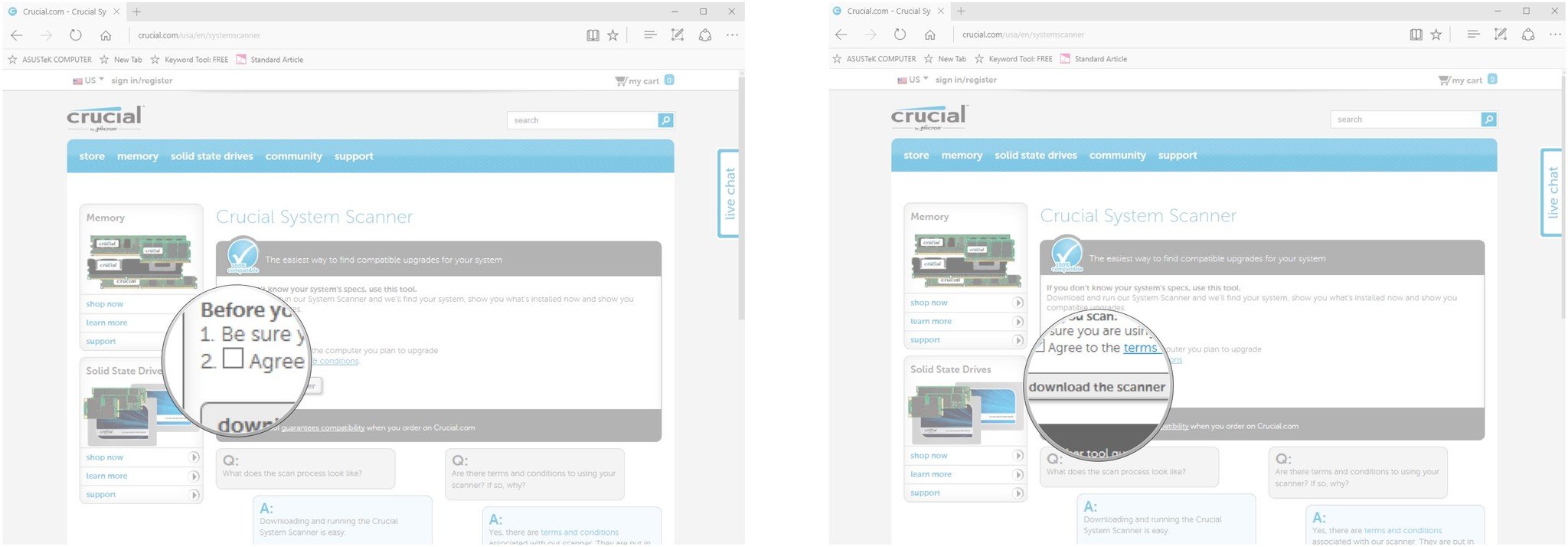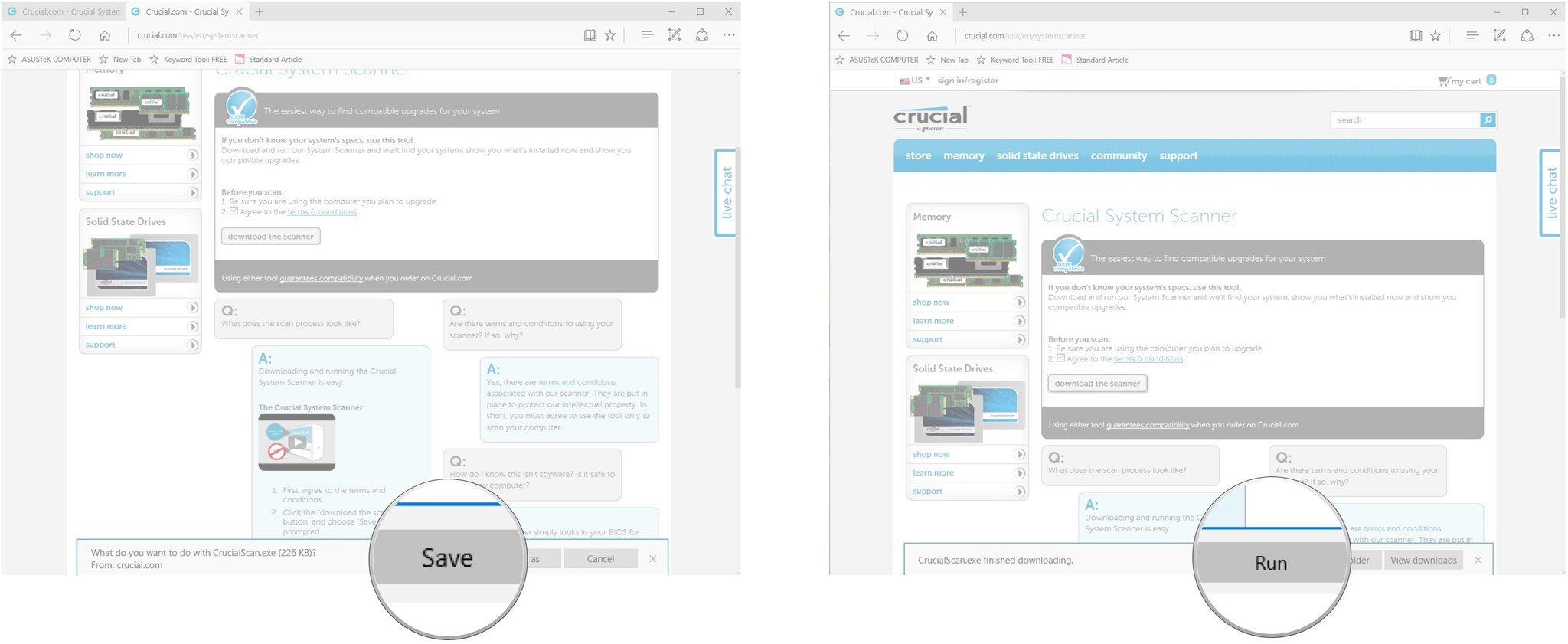How to Check Type of Ram Windows 7

RAM, or random access memory, is a vital hardware component used by your Windows 10 PC to store temporary data that can be accessed quickly by software, speeding up processes and keeping you from banging your head against the desk in frustration. Essentially, the more RAM you have, the more you can have going on at once.
The amount of RAM you need in your PC depends on what you plan on doing — gaming, for instance, takes a generous amount of RAM, and media editing can take a lot of RAM. Let's find out how much RAM you currently have, what type of RAM is compatible with your system, and how much RAM you should have for specific daily tasks.
- Benefits of upgrading your RAM
- How much RAM do you really need?
- Choosing RAM speeds
- Your PC's RAM configuration
- Best RAM for your PC
Benefits of upgrading your RAM

Let's get one thing straight: adding RAM to your computer is not a process that will magically make everything faster. It will, however, aid your PC in multitasking and performing heavy duties like gaming and multimedia editing. More RAM doesn't make the computer faster, but it will make it harder for it to get bogged down.
If you have a PC with a beefy graphics card (GPU) and fast processor (CPU) but you can't figure out why 17 browser tabs won't simultaneously load without grinding things to a halt, adding RAM will probably help.
If you have an old PC that you want to eke a few more years out of, adding RAM could make the difference between a couple years of frustration and a couple years of fond memories.
How much RAM do you really need?

How much RAM you need in your PC depends heavily on what you use your PC for on a day-to-day basis and on how long you intend to keep the computer. If you're thinking of investing in a completely new machine in the near future, waiting things out might be the best bet.
If you already have a computer you love but want to shift gears into a different daily task that requires better performance, upgrading your RAM as part of the process is a great idea.
Productivity
If you use your Windows 10 computer for word processing, checking emails, browsing the internet, and playing Solitaire, you should have no problem using 4GB of RAM. If you are performing all of these activities at once, however, you might experience a dip in performance.
A lot of budget PCs come with 4GB of RAM as a base option, but if you plan on keeping your machine for several years, opting for 8GB of RAM is the safer bet, even if you only use it for light duties.
Gaming
I'm not talking about Solitaire — heavy PC gaming at acceptable performance levels requires a substantial amount of RAM. Popular esports titles like DOTA 2, CS:GO, and League of Legends will allow you to get away with 4GB, but other popular titles, like Fallout 4, Witcher 3, and DOOM, will need at least 8GB to run properly.
If you're a gamer and want to ensure you have enough RAM for some current titles and future titles, go with at least 16GB. If your budget allows, why not push it up to 32GB?
Related: Best current RAM deals
Virtual reality (VR)

VR is a relatively new medium, at least in its latest incarnation, and it requires a good chunk of RAM to run smoothly. I'm referencing HTC Vive, Oculus Rift, and Windows Mixed Reality (WMR) here, all of which should have at least 8GB of RAM on the associated PC to run smoothly.
The Vive only recommends 4GB, but, honestly, go with at least 8GB; you have to take into account the games you'll be playing, many of which require a decent amount of RAM to run smoothly.
Game streaming
If you'd like to join the thousands who stream video of themselves playing games or other activities, go with at least 8GB of RAM but consider opting for 16GB or even 32GB depending on the game's requirements. Your PC has to deal with both running the game and streaming video to the internet at the same time.
Need a hand getting your stream set up? We have a guide for that!
See a beginner's guide to Mixer streaming
Video and photo editing
This really depends on your workload. If you're editing a lot of HD video, go for 16GB or more. If you're working with photos and a bit of video thrown in, 8GB should get you through.
Editing apps will work on lower amounts of RAM, but you'll become so frustrated with the poor performance you'll soon start yearning for an upgrade. Don't skimp here.
Choosing RAM speeds

Not only do you need to think about how much RAM you have, you also need to think about the speed of the RAM in your PC. RAM's frequency affects the maximum bandwidth. If you want more data to be moved back and forth at once, you need to go with RAM with a higher frequency. Latency, on the other hand, is how fast your RAM realizes it needs to act when the CPU calls on it.
Column Access Strobes (CAS) latency has increased as the frequency of RAM has increased, but true latency has remained about the same due to a decrease in clock cycle times. That means you can get high-speed DDR4 RAM with about the same true latency as older DDR3 RAM that's only about half the speed.
If you're doing any sort of high-performance task on your PC, opting for a higher frequency — measured in megahertz (MHz) — is the best plan of action.
Your PC's RAM configuration

RAM configurations differ depending mostly on your motherboard. Some motherboards have four dual inline memory module (DIMM) slots for RAM, some have two, some have a lot more. Here's how to see how much RAM you currently have, what type of RAM is compatible with your PC, and how many slots you're currently working with.
How to check your PC's current amount of RAM
This method will simply and quickly tell you how much RAM your PC currently has installed:
- Right-click the Start button.
- Click System.
-
Verify the Installed memory (RAM) line. (In this case, you can see I have 8GB of RAM installed.)

How to check RAM configuration and compatible RAM using Crucial System Scanner
To take things even further, Crucial System Scanner is a great app that will scan your computer and show you how much total RAM your motherboard and processor can handle, how many slots are available for RAM, and some options for purchasing compatible RAM.
- Navigate to www.crucial.com/usa/en/systemscanner.
- Click the checkbox next to Agree to the terms & conditions.
-
Click download the scanner.

- Click Save. The download will begin.
-
Click Run when the download is complete.

When the scan is complete you will see on the left side of the window a memory section with the number of slots for RAM and the maximum amount of RAM your PC's motherboard can handle. In this case, the motherboard has two slots and can handle up to 32GB of RAM.
You will see on the right side of the window a list of compatible RAM available for purchase from Crucial. This is a clear indicator of what type of RAM your PC uses, and is a great tool for anyone not comfortable with buying RAM on their own. In this case, you can see that my PC is using DDR4 SODIMM RAM.

RAM is available in two common types: DDR3 and DDR4. DDR4 is newer than DDR3 and uses a different pin configuration to fit into your motherboard. For this reason, DDR3 RAM can't go into a motherboard designed for DDR4, and vice versa. Also, "small outline dual inline memory module" (SODIMM) RAM won't fit in a standard RAM slot — it's just too small. If you're using a laptop or an all-in-one PC, chances are you've got SODIMM RAM inside, so keep that in mind when you're buying RAM.
Related: How to install RAM in your desktop or laptop PC
Best RAM for your PC
Once you determined how much RAM you need for your specific PC duties and what type of RAM works with your processor and motherboard, you can start shopping.
If you aren't completely confident when buying RAM, worry not. We've put together an ultimate RAM buyer's guide that should answer any questions you might still have. Plus, check out our roundup of the best DDR4 RAM available now for some great suggestions.
- Ultimate RAM buyer's guide for Windows 10 PC users
- Best DDR4 RAM for your PC
- How to pick the right PC upgrades for you
Updated June 27, 2018: We refreshed this article to ensure you're still getting current information about how much RAM you really need in a PC.

See more
These are the best 27-inch monitors money can buy
A 27-inch monitor is just about the perfect size without having to sit too far away or whip your head back and forth to follow things across the screen. If you're in the market for a new monitor, check out our top picks.
How to Check Type of Ram Windows 7
Source: https://www.windowscentral.com/how-much-ram-does-your-windows-10-pc-really-need



0 Response to "How to Check Type of Ram Windows 7"
Post a Comment